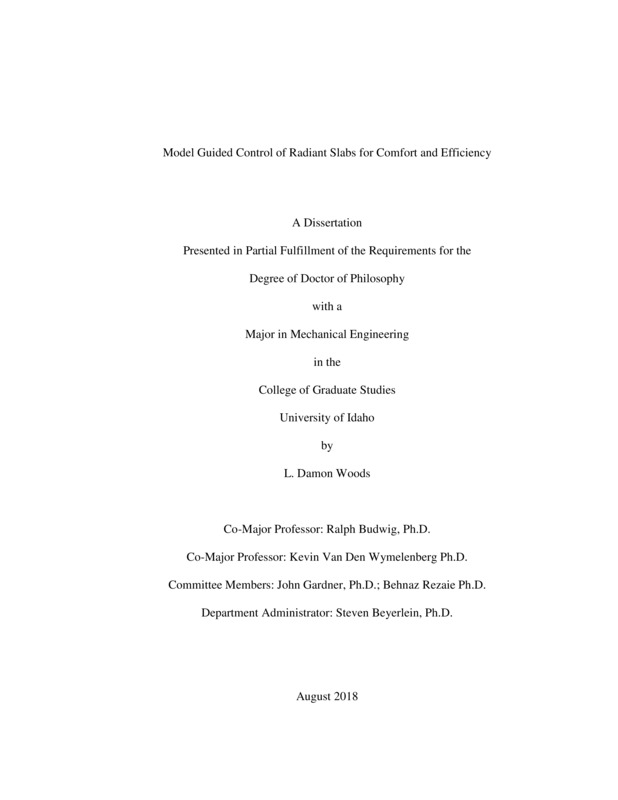Model Guided Control of Radiant Slabs for Comfort and Efficiency
Woods, Lindsay Damon. (2018-08). Model Guided Control of Radiant Slabs for Comfort and Efficiency. Theses and Dissertations Collection, University of Idaho Library Digital Collections. https://www.lib.uidaho.edu/digital/etd/items/woods_idaho_0089e_11421.html
- Title:
- Model Guided Control of Radiant Slabs for Comfort and Efficiency
- Author:
- Woods, Lindsay Damon
- Date:
- 2018-08
- Keywords:
- Energy Efficiency HVAC Model Predictive Control Radiant Thermal Comfort
- Program:
- Mechanical Engineering
- Subject Category:
- Mechanical engineering; Architecture
- Abstract:
-
Radiant slabs have the potential to deliver efficient heating and cooling to buildings while enhancing comfort. However, these systems do not operate on conventional time scales and there is often a delay between a thermostat’s signal and the system’s response. This research lays out a framework of how to overcome this problem by linking an energy model to weather forecasts to inform the controls. An overview of radiant systems and technologies demonstrates its inherent advantages for conditioning buildings. A method for connecting an energy model to control hardware for remote co-simulation is developed and tested. Results indicated operational savings of at least 12% could be achieved through the remote co-simulation approach. Once it was verified that an OpenStudio model could be used for virtual commissioning, the focus turned towards modeling of a radiant slab. Extensive data was collected at a design office in Boise Idaho with a radiant slab used for heating and cooling. An OpenStudio model was built and calibrated so that it could predict the heating and cooling required of the radiant slab in real time. A framework is set up for performing parametric simulations and incorporating weather forecasts into the energy model. The model was used to predict ideal control setpoints by using short simulations of four hours into the future. Model comparisons indicated that using the model to guide the control setpoints could save up to 13% of HVAC energy over one month and the office space was kept significantly more comfortable compared to the current control scheme.
- Description:
- doctoral, Ph.D., Mechanical Engineering -- University of Idaho - College of Graduate Studies, 2018-08
- Major Professor:
- Budwig, Ralph; Van Den Wymelenberg, Kevin
- Committee:
- Gardner, John; Rezaie, Behnaz
- Defense Date:
- 2018-08
- Identifier:
- Woods_idaho_0089E_11421
- Type:
- Text
- Format Original:
- Format:
- application/pdf
- Rights:
- In Copyright - Educational Use Permitted. For more information, please contact University of Idaho Library Special Collections and Archives Department at libspec@uidaho.edu.
- Standardized Rights:
- http://rightsstatements.org/vocab/InC-EDU/1.0/

